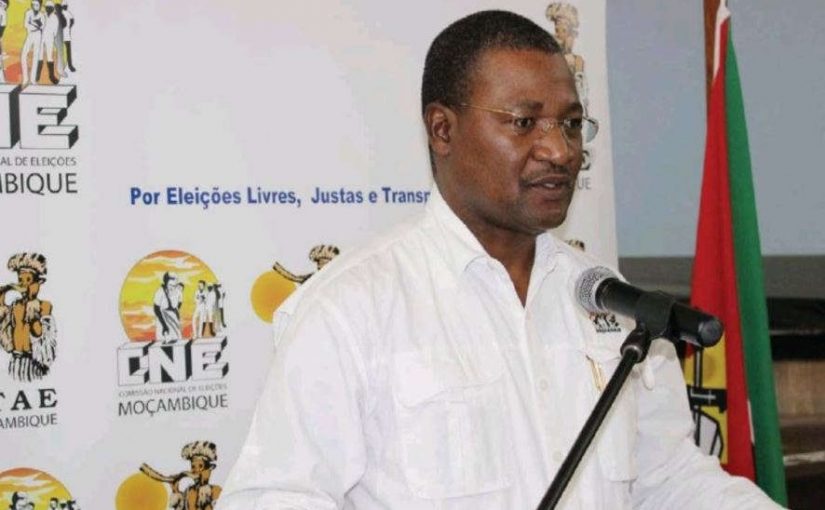Mozambique: Threats to security no longer strictly military
CNE rejects AJUDEM’s list of candidates – AIM report

Cuinica claimed it was too late for AJUDEM to replace the candidates who dropped out – but this interpretation of the law is strongly contested. File photo: Voa Portugues
Mozambique’s National Elections Commission (CNE) on Thursday rejected the list of candidates for the Maputo Municipal Assembly presented by the civil society group “AJUDEM”.
The AJUDEM list, for the municipal elections scheduled for 10 October, had attracted particular attention because it was headed by Samora Machel Junior (“Samito”), the son of Mozambique’s first president, Samora Moises Machel. Under the current legislation governing municipal elections, the head of the list of whichever party or group wins most votes automatically becomes mayor.
CNE spokesperson Paulo Cuinica told AIM on Friday that the AJUDEM list was rejected because it did not have enough supplementary candidates. Any list must have enough candidates to fill all the seats in the Municipal Assembly (64 in the case of Maputo), plus at least three supplementary candidates.
Initially, the AJUDEM list seemed to meet all these conditions, and was accepted by the CNE. But then four of the AJUDEM candidates claimed that AJUDEM had falsified their documents, and said they wanted to withdraw their names.
Cuinica said the four had now complied with the legal formalities, and had submitted to the CNE signed declarations, recognised by a public notary, that they did not wish to be on the AJUDEM list. With these four dropping out, the AJUDEM list no longer has enough candidates.
AJUDEM strongly rejects the claim that it falsified any documents, and says all its candidates signed up to the list voluntarily. AJUDEM officials have accused figures in the ruling Frelimo party of putting pressure on candidates to remove their names, even threatening them with loss of their jobs in the public administration.
AJUDEM is a coalition of organisations that are close to Frelimo, and whose members were angered when Machel was not even put on the short list of Frelimo candidates for mayor. They believed that most Frelimo members in Maputo wanted Machel as a candidate, and when he was excluded, he was offered the position at the head of the AJUDEM list.
AJUDEM also suffered a break-in on Wednesday morning, when unknown assailants ransacked its office. However, AJUDEM had taken the precaution of not keeping anything valuable or sensitive in the office.
The CNE decided by nine votes to seven to reject the AJUDEM list. The nine votes came from CNE members appointed by Frelimo, and the Mozambique Democratic Movement (MDM). The seven who supported AJUDEM were appointees of the main opposition party, Renamo. CNE members from civil society were divided over the issue. The CNE chairperson, Abdul Carimo, did not vote.
Cuinica claimed it was too late for AJUDEM to replace the candidates who dropped out – but this interpretation of the law is strongly contested. One of the Renamo CNE appointees, Fernando Mazanga, told the independent television station STV that the CNE should have given AJUDEM five days to replace the four candidates who pulled out.
“Individuals are free to be on a list or not”, he said, “but since some later resigned, the CNE should have notified AJUDEM and its election agent to replace them within five days”. Mazanga also wanted proof that the documents of the four had been forged – for when they were accepted by the CNE there was no sign that they had been falsified. It is not an easy matter to forge a criminal record certificate, which should be issued only in the presence of the applicant who must state what he or she needs it for.
Mazanga’s opinion is much the same as that of one of the country’s foremost jurists, Teodato Hunguana, who is a former judge on the Constitutional Council, Mozambique’s highest body in matters of constitutional and electoral law. He is also a prominent member of Frelimo who has held several senior government positions.
In an opinion article published by the independent daily “O Pais”, Hunguana said replacing candidates was an “unquestionable prerogative” of parties or groups contesting elections. If this was not the case, “then an element of extreme insecurity and possibly of manipulation and bad faith would be introduced which the electoral law cannot permit”, he warned. Arguing otherwise, he said, “would be to legitimise all manner of electoral chicanery, presumably in order to eliminate competitors”.
AJUDEM can appeal against the CNE decision to the Constitutional Council.












Leave a Reply
Be the First to Comment!
You must be logged in to post a comment.
You must be logged in to post a comment.